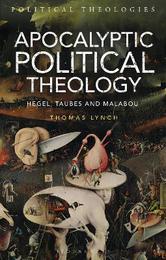
|
Apocalyptic Political Theology: Hegel, Taubes and Malabou
Hardback
Main Details
| Title |
Apocalyptic Political Theology: Hegel, Taubes and Malabou
|
| Authors and Contributors |
By (author) Thomas Lynch
|
| Series | Political Theologies |
|---|
| Physical Properties |
| Format:Hardback | | Pages:216 | | Dimensions(mm): Height 234,Width 156 |
|
| Category/Genre | Social and political philosophy
Philosophy of religion
Christian theology |
|---|
| ISBN/Barcode |
9781350064744
|
| Classifications | Dewey:201.72 |
|---|
| Audience | | Tertiary Education (US: College) | |
|---|
|
Publishing Details |
| Publisher |
Bloomsbury Publishing PLC
|
| Imprint |
Bloomsbury Academic
|
| Publication Date |
24 January 2019 |
| Publication Country |
United Kingdom
|
Description
Hegel's philosophy of religion contains an implicit political theology. When viewed in connection with his wider work on subjectivity, history and politics, this political theology is a resource for apocalyptic thinking. In a world of climate change, inequality, oppressive gender roles and racism, Hegel can be used to theorise the hope found in the end of that world. Histories of apocalyptic thinking draw a line connecting the medieval prophet Joachim of Fiore and Marx. This line passes through Hegel, who transforms the relationship between philosophy and theology by philosophically employing theological concepts to critique the world. Jacob Taubes provides an example of this Hegelian political theology, weaving Christianity, Judaism and philosophy to develop an apocalypticism that is not invested in the world. Taubes awaits the end of the world knowing that apocalyptic destruction is also a form of creation. Catherine Malabou discusses this relationship between destruction and creation in terms of plasticity. Using plasticity to reformulate apocalypticism allows for a form of apocalyptic thinking that is immanent and materialist. Together Hegel, Taubes and Malabou provide the resources for thinking about why the world should end. The resulting apocalyptic pessimism is not passive, but requires an active refusal of the world.
Author Biography
Thomas Lynch is Senior Lecturer in Philosophy of Religion at the University of Chichester, UK.
ReviewsThis exciting new book in the field of political theology provides a helpful reading of the often-denigrated figure of Hegel, the often-glossed figure of Taubes, and the work of Malabou-who has not-to my knowledge-been read as an aid to political theology. * Reading Religion * This is the book political theology has been waiting for: a superb orientation in the field, which also sets out a compelling argument for the end of the world as we know it. -- Steven Shakespeare, Senior Lecturer in Philosophy, Liverpool Hope University, UK Thomas Lynch is emerging as an original and creative voice in Continental Philosophy of Religion. In this book, he brilliantly situates Jacob Taubes between Hegel and Malabou to create an apocalyptic political theology. Anyone interested in these topics or figures has to read this book! -- Clayton Crockett, Professor and Director of Religious Studies, University of Central Arkansas, USA Thomas Lynch conducts an orchestra of Continental philosophers and theorists in order to push forward discussions of political theology. With an expansive knowledge of the most exciting conversations in the field, Lynch clarifies the nettlesome concept of apocalypticism while also demonstrating its importance for getting political theology right. Lynch's work will help us think more carefully about hope and pessimism, the end of the world and the start of new worlds. -- Vincent Lloyd, Associate Professor of Theology and Religious Studies, Villanova University, USA If the divisions of nature, capital, gender and race constitute this world, what does it mean to think the end of the world today? Lynch's Apocalyptic Political Theology offers important insights for a critique of the world as it is. His apocalyptic political theology is the conceptual tool to experiment with new possibilities. Thinking with Hegel, Taubes and Malabou on the sense of the apocalyptic time rather than thinking about each of their ideas is the most interesting challenge of the book. -- Elettra Stimilli, Assistant Professor of Philosophy, Sapienza University of Rome, Italy
|